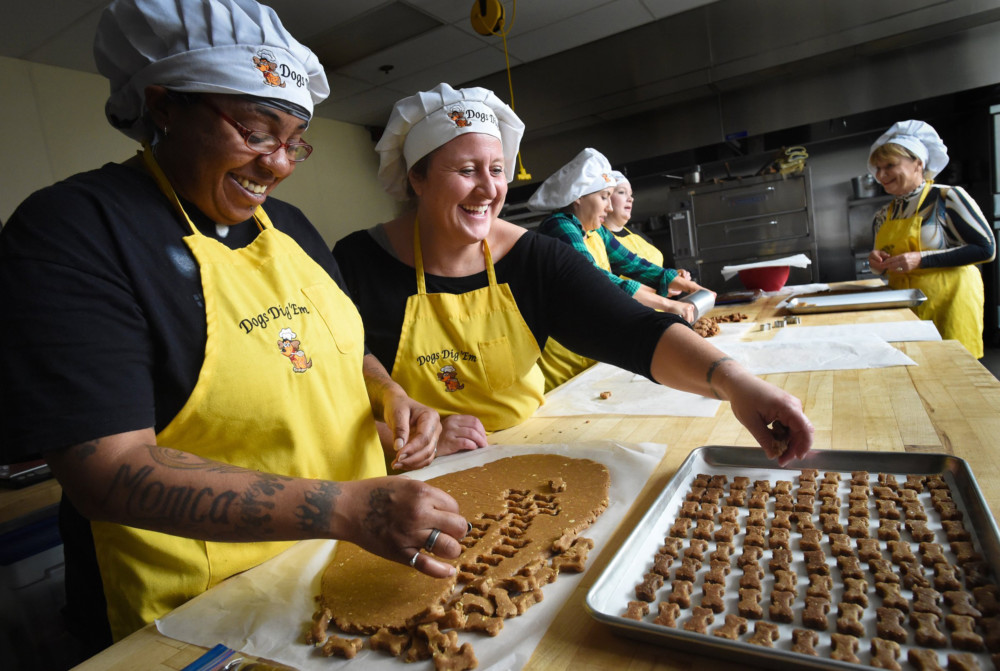By Carmen George
The Fresno Bee
WWR Article Summary (tl;dr) The St. Francis Homeless Project’s “Dog’s Dig ‘Em” ministry program employs women for six months who are recovering from a drug or alcohol addiction. Participants are referred after getting sober through a substance abuse rehabilitation program.
FRESNO, Calif.
Wearing white floppy chef hats and sunny yellow aprons, a group of women chat happily as they mix and roll dough on its journey to becoming all-natural dog biscuits last month. Morning light pours through large wide windows, brightening an already optimistic mood.
They look like carefree culinary students in this kitchen at the Institute of Technology in Clovis, but they aren’t. These are women who daily fight and win brutal internal battles with addiction.
This is the first graduating class of five to complete the St. Francis Homeless Project’s Dog’s Dig ‘Em ministry program, which employs women for six months who are recovering from a drug or alcohol addiction. Participants are referred by WestCare after getting sober through a substance abuse rehabilitation program.
For many, making and selling dog biscuits four to 12 hours a week was their first employment in months or years, and the boost they needed to get back into the workforce. Four of the five found other employment in food service while participating in the program.
Dogs Dig ‘Em gave participant Sonya McCraney a new self-confidence and faith in the goodness of humanity. She was surprised by the positive response she received selling dog treats last year at the Central California Women’s Conference and Fresno Food Expo.
“It felt good that they would actually buy from a black person,” jokes McCraney, who describes herself as from the “way-low poor class”
McCraney was stumped by chief executive officer Sandra Kaye’s decision to hire her.
“I’m from the hood, you know what I’m saying? Why is she giving me a chance?” McCraney recalls. “So it gave me a lot of hope.
She’s always telling me it doesn’t matter what color you are or whatever. That’s how my mindframe changed. Being at the home expo show, those people didn’t look at the color of my skin, they were looking at my soul and my heart. That gave me a lot of hope, coming from my addiction.”
Jessica Streeter also got a lot out of selling dog treats at the events.
“When you’re trying to get clean and get back into society and be around normal people, you feel uncomfortable, you feel less-than, like you don’t belong there,” Streeter says, “and the cool thing about Sandra is she’ll push us out there at the home shows, women’s conference. She just takes us in there like we belong there, and I think after a while we start believing that.”
Addiction has been a lifelong struggle for McCraney, who started taking methamphetamine at age 15.
“I’ve been clean six months, nine days today,” McCraney says during her final Dogs Dig ‘Em baking session last month. “That’s the longest I’ve ever been clean in my whole life. I (recently) had my first birthday clean and sober. I’m 40 years old.”
As her addiction became more overwhelming, she decided to start a drug detox program.
“I was just tired. I was slamming meth. I was 95 pounds. I was miserable. I was broken. I was lost. And I would still pray to God to take this addiction away from me when I was still using.”
The St. Francis Homeless Project is helping keep her and the others away from drugs and alcohol.
Kaye got the idea to start the Dogs Dig ‘Em ministry after watching an emotional television show featuring a homeless man and his dog. After it was done, she Googled “dogs helping homelessness” and discovered a similar work program at a homeless shelter in Kansas, which she modeled Dogs Dig ‘Em after. Kaye hopes the program will give participants a “second chance and some hope.”
Katy McCoy shares some words of encouragement for others struggling with addiction as she bakes last month.
“They don’t need to be thrown away, they are not cursed,” McCoy says. “They just have to have a little confidence and believe in yourself.”
Cynthia Sieling says something similar.
“I just keep getting healthier and healthier every day,” Sieling says. “That’s the main thing that all of us I think have gotten out of this, is the hope part, and the confidence in ourselves.”














































































































































































































































































































































































